- Home
- Laurence Yep
A Dragon's Guide to Making Perfect Wishes Page 3
A Dragon's Guide to Making Perfect Wishes Read online
Page 3
Unfortunately, I think Lorelei had noticed Winnie yawning because when she finished, she threw an angry look at my pet. I thought of having Winnie apologize to her, but at that moment, a servant came over to us with two badges. “Your travel charms, ma’am and miss.”
The badges consisted of pins with the club’s name, from which hung an oval token picturing the Tower of Jewels and red, white, and blue ribbons. “Please wait until Mr. Willamar tells you to put them on.”
When everyone had a badge, Willamar motioned to the screen. “My thanks to Lady Louhi for making the travel charms that will make sure we won’t change the past.”
Lady Louhi looked at us over the top of the screen. “The charms will put you a few nanoseconds ahead in time and space of your surroundings. The advantage is that you won’t be seen or touched. The drawback is that you won’t be able to touch or pick up anything. But I’ve adjusted the spell so you can see and hear what’s happening around you. And you’ll feel the cold and the heat.” She added with a smile, “And though you can’t really touch anyone, others may feel your presence.”
Clever, clever Lady Louhi. I would never have thought of magic like that—or had the knowledge and ability to create it.
“If people in this time can’t see me, I could have worn my regular clothes,” Winnie complained to me.
“Our costumes will get us in the mood,” I said. “Think of it like Halloween.”
“But now I won’t be able to get a present for Mom.” Winnie sighed.
“I think she would prefer you didn’t alter time to giving her a souvenir towel,” I observed.
In front of us, Willamar held up his arms. “It’s time to put your charms on.”
I fixed Winnie’s badge to her jacket and then put on mine. When the others had done the same, Lady Louhi murmured a word that must have activated them because the room shimmered for a moment. Winnie reached for a chair, but instead of grabbing it, her hand went right through it. “Whoa, it’s like being a ghost.”
I reached over and tapped Winnie’s arm experimentally. “Did you feel that?”
“I guess we can touch one another,” Winnie said.
“Now, a warning.” Lady Louhi sounded like a teacher with an unruly group of children. “Be sure to stick with the group because there is a time limit on the spell. But if you get separated, you must be here by midnight to return to our own time. If you’re late, you’ll be stranded in the past, and your badges will no longer hide you.”
“The High Council wouldn’t leave us there,” Silana objected. “They’d send a rescue party for us.”
“Yes,” Lady Louhi said, and added ominously, “and then there would be consequences.”
I was sure those “consequences” would be more severe than slaps on the wrists. The High Council would send their own enforcers—but not to rescue so much as to minimize any damage the tardy one might have caused to the time stream. Inconveniencing others was one thing; endangering all of time was quite another.
Willamar was quick to keep the mood a cheerful one. “But that’s not going to happen because we are all going to stay as a group.”
Lady Louhi dropped back behind the screen, and a moment later, the air began to tingle. Wisps of hair got loose from Winnie’s hairdo and swayed from side to side like trees in the wind. Sparks began to dance across my scales in response to the potent magic Lady Louhi was creating.
Suddenly I felt like I was being turned inside out and then back again. I checked on Winnie. She was looking a little green but determined to stand on her own.
Before I could ask her if she was all right, screen, floor, walls and the entire house vanished, and we were standing in the open air on a sandy empty lot with the sun at its apex overhead. Though we had left Willamar’s mansion at night, it was now midafternoon. We were on the same spot but in 1915.
There were several houses and stores already on both sides of the street, but most of it was empty sand and weeds. These lots had been divided with stakes and cord. As valuable as this area became in Winnie’s time, it wasn’t very desirable now. The land was prone to flooding, and parts could become marshy. So in the years after the earthquake and fire, it had become a convenient spot to dump the debris.
Winnie glanced up at the sky. “When we went to the party, it was already evening, but now it’s the afternoon again.”
Winnie’s hair had become even messier in traveling through time. I smoothed it down and straightened her hat as best I could with my hand. “An enchanter as skillful as Lady Louhi can travel to any day and hour. This way we’ll have more time at the Exposition.”
Right in front of us was a river of excited people heading in the same direction, many in horse-drawn buggies, bicycles, automobiles, and open-sided trucks with signs that said SHUTTLE and many more on foot.
Nostalgia cloaks the less pleasant memories, so I’d forgotten that sometimes the Exposition was too popular. It seemed like everybody in San Francisco was trying to get to the fair right now. The pedestrians got in the way of the vehicles, so everyone was reduced to a slow crawl.
In the meantime, behind us, Willamar’s servants had stacked up their backpacks. One of them was taking goodies from them and setting them on a canvas picnic-style so we could eat and drink upon our return. The other servants circled around the club members and hoisted their flags up high to form a border around us.
Willamar flung his hand up in a grand flourish and shouted like a circus ringmaster, “Ladies, gentlemen, and sentients, I give you 1915! Welcome to the greatest World’s Fair and the most mystifying theft of all time!”
Stepping off the curb, Willamar led the way with Lady Louhi on one side and Sir Isaac on the other. Winnie gave a little cry as they disappeared under 1,200 pounds of metal but after the Ford Model T chugged on, they stood unharmed in the road.
“Q.E.D.,” Sir Isaac declared to the fellowship. “We are as safe as my esteemed colleague promised.”
We surged after them as a group with Winnie and I walking straight through a family of four. A little girl giggled, wriggling happily from her shoulders down to her toes. And I felt a pleasant sensation as if a giant feather was tickling my insides. Well, Lady Louhi was right, our presence could certainly be felt.
“Cool,” Winnie said. “It’s fun being a ghost.” She thrust her arm experimentally into a big man carrying a chunky box camera. When he started chuckling, she walked next to him so she could keep twirling her arm inside him. The chuckling turned into laughs and then body-shaking guffaws. People turned to stare at him.
While tears rolled down his cheek, he roared, “I don’t know what’s gotten into me.”
It was literally an imp named Winnie.
“It’s impolite to torment someone when you haven’t been properly introduced,” I said, forcing Winnie’s arm to her side.
“I made him laugh. That’s not torment,” Winnie argued, but she kept her arm down.
Since we could move through solid objects and people, we could walk at a faster pace than the crowd. Anticipating the fun of the fair, they were cheerful to begin with, but when the club passed through them, they even became merrier. You could have tracked us by the path of laughter we left behind us.
Still, it was easy to lose sight of our fellow time travelers. While we stayed with the flags, we would be walking with the rest of the club. But the servants holding the flags would also keep us together as a group. It was probably another one of the High Council’s conditions for this trip.
The only problem was that the Heart of Kubera was stolen at the same moment that Caleb would be shopping for souvenirs at a kiosk, and the spots were far away from one another. However, the High Council hadn’t ordered me to stay with the Fellowship, so it couldn’t punish me for leaving the group and showing Winnie her ancestor.
I came up with an idea, but I had to give Winnie a choice. “We need to make a decision quick,” I told her. “Do you want to try to catch the thief who took the Heart of Kubera, or do you wan
t to meet your great-grandfather?”
Winnie thought for a moment. “The Fellowship’s got me sort of curious about the thief now.” My pet was learning to read my moods a little. “But you want to see Great-Granddad, don’t you?”
“Yes,” I admitted, “but this trip is for you. So don’t try to please me. I want to do what you want.”
She bit her lip. “I guess I’m still more curious about my great-granddad.”
I clasped her hand tighter, both relieved and grateful. “Then walk at the same pace I do.”
When I heard the horn honking behind me, I glanced backward and saw an aggressive shuttle driver squeezing the bulb of his horn repeatedly and forcing his way slowly through the pedestrians.
I slowed, knowing that we had to time this just right. And Winnie shortened her steps to stay by my side.
Suddenly I doubled over.
My body tingled as the shuttle’s grill passed through Winnie and me so that we were now within the clanking, rattletrap vehicle. The engine’s pistons pounded up and down around me, and I spoke louder so Winnie could hear me.
“Walk faster now so we can stay inside the shuttle,” I instructed her.
“Huh, so this is what a motor looks like when it’s moving,” she said from somewhere around the carburetor.
She and I quickened our stride so that the truck would mask us from the others. After fifty yards, I judged it safe to slow down again and let the shuttle go on. First the driver and then his passengers all gave little laughs as they felt us pass through them.
When the shuttle had gone, I risked a glance at the rear. The flags marking the front of the club were now about twenty yards behind us.
“Hurry up,” I said, and we broke into a run.
A ripple of laughter ran through the dense crowd, marking our passage. But there were no shouts from Willamar to stay with the Fellowship.
“To the right,” I said, and we headed into a side street, hiding in the doorway of a store. I peeked around the corner and saw the flags of the club march past us and toward the main gate on Scott Street.
We were free!
CHAPTER FOUR
You can’t judge a treasure from the past by its price tag. What we truly treasure of the past can take surprising forms—like the Sphinx, odd machines, and buttered biscuits.
MISS DRAKE
We scooted through the turnstiles of the Fillmore Street gate and headed into the Joy Zone, the amusement area of the Exposition.
The Zone was mobbed as it always was, and many of the fairgoers must have been first timers because they had paused on the broad avenue like Winnie to stare. Each building’s front was shaped to show what was inside, so two giant ostrich statues welcomed one to the ostrich farm, and a titanic Sphinx and arch with hieroglyphics advertised the alligator farm, though the alligators most likely came from Florida, not Egypt. Towering above them all were redwood-size toy soldiers who stood guard before Toyland. Even though I had been here many times before, I felt as if I had wandered into the dream of some slumbering giant.
Around us, I heard English mainly, but I caught snatches of French and Spanish and Japanese and a dozen other languages too commenting on their extraordinary surroundings.
“The crowd’s like a mini-UN,” Winnie commented.
“Caleb used to say that we invited the world to our party, and the world came,” I agreed proudly. “And with their exhibits, the people of the world shared their achievements, art, and lives with us.”
Winnie pointed at the Scenic Railway with the artificial elephants holding up the track. “Hey, let’s ride that.”
I took her hand and gave a gentle tug. “No, I have something else in mind for your first ride.”
Though the Zone’s rides had been novel to a child of 1915, I was afraid that they would seem tame to a girl who was used to computerized, roboticized amusements of the twenty-first century.
But there was no way I could allow for the fair’s chance delights. When I saw the float with the huge globe of the world bearing down on us, I drew Winnie to the side to give us a better view.
“What’s wrong?” she asked.
“There’s a parade coming,” I said.
Like the Grand Bazaar of Istanbul, the Exposition had always provided wonderful chance encounters, bits of sweet serendipity. I hoped it would give Winnie meaningful memories just as it had Caleb.
Behind the float came hula dancers waving to the spectators, followed by Greeks in embroidered vests and red caps, Norwegian women with their hair in braids, Russians in fur capes, Maoris, and Chinese, each group doing a few steps of a dance. It was a preview for a folk dance festival later that afternoon.
When Caleb had encountered people from faraway places or wandered the state and national pavilions, his eyes had shone with all the excitement, wonder, and curiosity of a chick breaking out of its shell.
We joined the cheerful crowd trailing the dancers, and I glanced at Winnie, who danced a playful step or two. Though she was enjoying herself, this event wasn’t a unique opportunity to her. After all, she only had to tap a few keys on her computer if she wanted to learn about the world, so the parade was simply a chance to party.
There was nothing wrong with having fun, but today needed to be extra special. So when we reached the Aeroscope, I slipped my arm around her shoulders and drew her toward the ride. “I want this to be your first taste of the Exposition.”
A double-decker cabin was attached to a long metal structure 265 feet long of steel girders like a quarter-size Eiffel Tower lying on its side. At the very bottom was a 380-ton block of concrete serving as the counterweight that with a motor would sling the cabin up into the air.
Winnie stared at it doubtfully. “Really? I think I’d rather see the alligators.”
“Indulge me, please,” I sniffed.
“All right, but you owe me,” Winnie grumbled, and reluctantly tagged along as I climbed to the cabin’s upper level.
Winnie gave a little cry and grabbed hold of me when the cabin lurched from the ground. The ride’s engine coughed as it lifted the cabin higher and higher into the sky with the help of the counterweight. “Whoa!” she said as the sounds from the Zone, the boisterous barkers, and chattering pedestrians faded away. And then I could smell the bay and hear the gulls boasting as they glided alongside coasting on the winds.
Winnie gasped happily as the cabin swung in a slow circle in the sky, sinking and then rising again and again to give us another 360 degree view of the city, the bay and the fair. Below us, all 635 acres of the fair spread from east to west like a long, lovely Persian carpet of soft colors and elegant designs, lying alongside the brilliant blue bay to the north. Ornate ivory palaces glittered with bits of matching jewel-like colors—turquoise borders, orange and green domes, brilliant blue pools—within spacious courtyards full of fountains, art, and gardens.
I have been to many world fairs in the last couple of centuries, and there was none that could match the loveliness of San Francisco’s. Though I had flown over the Exposition many times, it still took my breath away to see it from above. If the Council’s rules for this excursion into the past hadn’t specifically forbidden our true shapes, I would have taken Winnie for a flight like I used to do with Caleb.
As the ride ended and we returned to the earthly bustle, Winnie’s comment was short and sweet. “Awesome,” she said softly, grabbing my hand.
But she quickly let it go when we landed and scooted down the midway, now eager to sample more of it—whatever caught her eye next as we walked. She wouldn’t budge until we rode on the Hippodrome Carousel, always one of my favorites. But I prodded her away from the replica of the Grand Canyon, and the mini Panama Canal rides that delighted fairgoers, promising I would take her to the real places instead.
There just wasn’t time to see everything at the Zone if we also wanted to see some of the fair. But like Caleb, my energetic companion was curious about every astounding attraction. As I dashed after Winnie, I wished
I had designed some magical leash for my pet.
Catching her by the shoulders, I warned her, “Settle down, or I’ll take you to the Palace of Education and Social Economy.” That threat always worked with Caleb, and it did with his descendant too!
Wrinkling her nose, Winnie was about to say something, when a man carrying a crate walked through her. The man chuckled, and the pup in the crate started barking loudly.
When Winnie jumped at the noise, I explained, “He must be heading to a dog show.” I waved a hand. “The farm animals and pets were shown in a different part of the fair. Caleb won a red ribbon for his pet.”
“What kind did he have?” Winnie asked curiously.
“A marmoset,” I told her, smiling. “A hyperactive monkey Caleb loved.” I smiled, remembering how tiny Reggie would run around and around until he’d leap up on Caleb, climb inside his shirt, and fall asleep.
“Why didn’t you tell me my great-granddad had a pet monkey?” Winnie asked in astonishment. I think he was beginning to sound more interesting to her after all.
“It didn’t occur to me,” I confessed, and tried to correct my error now. “Caleb liked anything with animals, the livestock exhibits, all the shows and competitions, everything with horses and camels. But I usually waited for him nearby. Some of the animals, especially the horses, acted strangely around me, sensing perhaps I was not what I seemed.”
Winnie perked up at that. Since her mother, Liza, had worked in stables, horses seemed like cousins to her. “Let’s see the horses.”
“There’s not enough time,” I answered. “Besides, you’ll see horses during your next riding class at school.”
I tensed for the argument, but fortunately, Winnie was distracted by a laughing woman with large, lively eyes surrounded by reporters and photographers. “Oh, look at her!”
“That’s Mabel Normand, the actress,” I murmured to Winnie, who looked blank. “She was a big star in silent films. A lot of celebrities came to the fair.”

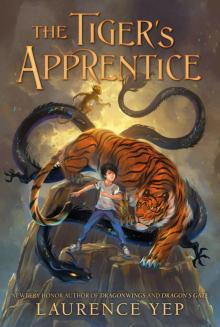 The Tiger's Apprentice
The Tiger's Apprentice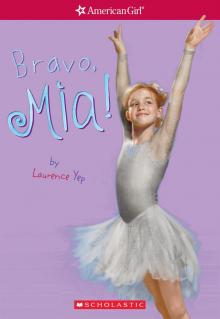 Bravo, Mia
Bravo, Mia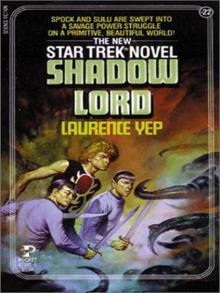 STAR TREK: TOS #22 - Shadow Lord
STAR TREK: TOS #22 - Shadow Lord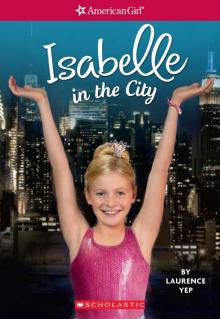 Isabelle in the City
Isabelle in the City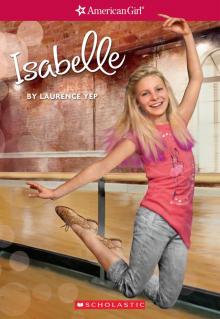 Isabelle
Isabelle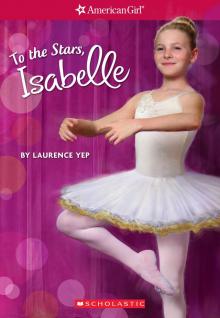 To the Stars, Isabelle
To the Stars, Isabelle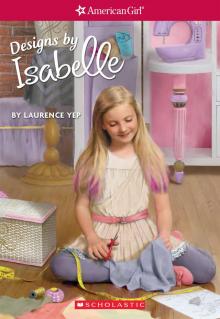 Designs by Isabelle
Designs by Isabelle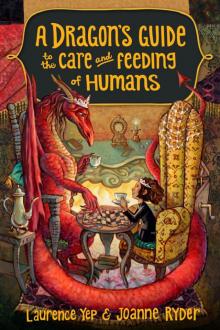 A Dragon's Guide to the Care and Feeding of Humans
A Dragon's Guide to the Care and Feeding of Humans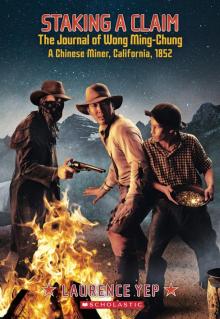 Staking a Claim
Staking a Claim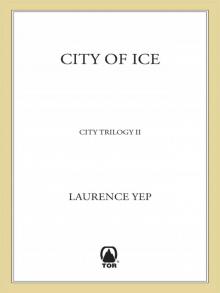 City of Ice
City of Ice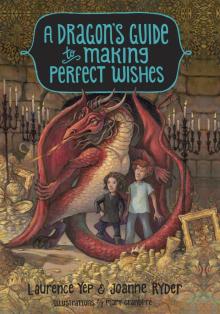 A Dragon's Guide to Making Perfect Wishes
A Dragon's Guide to Making Perfect Wishes City of Death
City of Death